
How Do You Make Neutral Spirits?
Different Grades and Types of Neutral Spirits
Where Can You Buy Neutral Spirits?
Taxes and Licenses Required to Buy Neutral Spirits
What is the role of Neutral Spirits in beverages? While not all alcoholic beverages start with neutral spirits or contain a neutral spirit. It is an integral base for some of our favourite alcoholic beverages. The two most popular drinks that start off with neutral alcohol is vodka and gin. In 2018, the UK export sales of gin rose by 15%, rising up to £612 million in 2018. The growth of this industry has been an impressive one and it would not at all be possible without the humble but mighty neutral spirit.
With over 20 years in the business, Ethimex is here with the ultimate neutral spirits guide to help you understand the key properties of neutral spirits, find out which type is the best for your needs, and what you need to know before purchasing bulk supplies of neutral alcohol. To see what premium neutral alcohol Ethimex has available click here to see our product list.
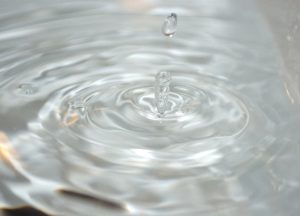
Neutral spirits, also known as neutral alcohol, rectified spirits, rectified alcohol or ethyl alcohol is highly concentrated ethanol distilled until it reaches a min. ABV of 95% (190 proof). Neutral spirits can be made from grains, grapes, molasses, potatoes, and other agricultural origins. As the name suggests, neutral spirits are considered neutral in flavour, odour and are colourless. Having said that, there are some slight “flavour” variations among the neutral spirits, leading some to question if neutral spirits are truly flavourless.
Neutral spirits are widely used to make spirits such as vodka and gin, as well as to ‘cut’ liqueurs and make bitters, besides from its use in the spirits production the neutrality of rectified spirits also makes it useful in other industries such as the food, non-alcoholic beverage, pharmaceutical, perfumery, and cosmetics industry. It is common for neutral spirits intended for cosmetics and perfumes use to have denaturing agents added to it to reduce tax and to prevent human consumption.
Different agricultural products are used to make neutral spirits, the most common one being grains (wheat, barley, corn, rye), molasses, potato, grapes, sugarcane or sugar beet. Although not always but in many cases, selecting which organic material to use is usually determined by what is readily available in the area and/or country.
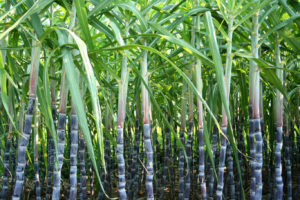
To make neutral or rectified spirits you need organic materials that contain either starch or sugar. Enzymes are added to starch to convert it into sugar (glucose, fructose, or sucrose) in a process called saccharification. If the organic material already contains sugar (e.g. grapes), no enzymes need to be added. The next stage is the fermentation. Yeast is added to the sugar mixtures, breaking it down into alcohol (ethanol) and carbon dioxide, which proceeds to bubble away or is captured and reused for other purposes, such as the production of soft drinks.
No matter what raw material is used to make a neutral spirit, the fermentation process only produces a small concentration of alcohol. Certainly not enough for it to be used to make your favourite spirit. To increase the alcohol concentration it has to undergo a distillation process. Distillation is the method of separating components in a liquid mixture through boiling and condensation.
There are two main distillation methods: column distillation and pot still distillation. Ethanol has a lower boiling than water (78.5 degrees versus 100 degrees Celsius). When the wash (the liquid mixture) is heated up, the ethanol vaporises first. There are three different stages of the vaporisation process. The first is to boil off (the component with the lowest boiling point) is the foreshot (also known as “heads”), followed by the "heart", and finally, the last to boil off is the feint (“tails”). Neutral ethanol is distilled via column distillation because it strips out more of the impurities and congeners. For beverages, the “heart” is the most desirable part of the liquid. This is where you get the flavour without the bitterness of the heads. That said, heads and tails are still of use. They are used to manufacture cleaning products and as low-grade industrial alcohol, or as distilleries can “recycle” them and reduce their environmental footprint.
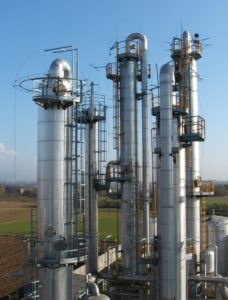
Once the gas is captured and cooled it produces a liquid mixture with a high concentration of alcohol. Yeast is no longer part of this mixture as it cannot survive in environments that have high levels of alcohol. Typically, one round of distillation produces 24-45% ABV. To create a purer solution (that is one with a higher ABV). The solution has to undergo a repeated round of distillation, called rectification. At the end of rectification, you are left with a colourless, odourless liquid that typically has a concentration of that is typically min. 95% ABV. It is this point where it is considered a “neutral” spirit.
There are different quality grades for neutral spirits, the grade of the spirits determines what its end use is.
Extra Neutral Alcohol (ENA), also known as extra-fine alcohol or surfin is a high distillate alcohol, free from impurities and with an ethanol grade of 96% ABV or higher.
ENA is used for both beverage and non-beverage uses.
The types of ENA below are the most popular for beverage uses.
Arguably the most popular neutral spirit. Neutral alcohol made from grains is called grain neutral spirits (GNS), neutral grain spirits (NGS) or neutral grain alcohol. The most popular grains to make GNS are corn, wheat, barley, and rye. GNS provides the base alcohol for distilling gin and vodka. Even though it is not a legal requirement for either to be made from grain. EU regulations on spirit drinks have only specified that both be made from “ethyl alcohol of agricultural origin.” Despite this, the popularity of gin production increase in recent years (especially in the U.K.) has increased the sale of GNS. Because gin and vodka do share the same base ingredient, it has led to a popular misconception that gin is juniper flavoured vodka, which it isn't. Gin is a neutral spirit infused with botanicals.
For those with coeliac or have a gluten intolerance, it’s important to note that alcohol made from grains that contain gluten (wheat, barley and rye) is considered as gluten-free because the distillation process, breaks down and remove the protein that triggers intolerances and allergies (corn is naturally gluten-free). That said, this does not apply to fermented alcohol, beer, for example, is not gluten-free.
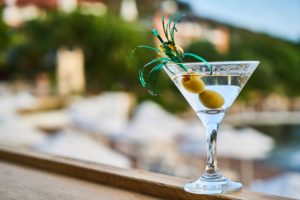
Also known as potato alcohol, extra-neutral alcohol made from potatoes are a popular choice to make vodka and aperitifs because it has a slightly creamy textured which makes it suitable for the base spirit. For those who are coeliac or are otherwise intolerant to gluten, we are happy to report that potato alcohol is also gluten-free.
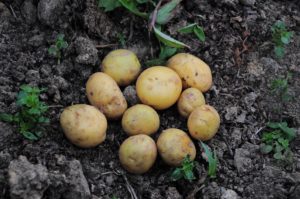
Grape neutral spirit, also known as vinous alcohol, grape alcohol, or wine alcohol in North America, is made from grape residue during wine production. Included in the grape residue are the pomace solid leftovers such as skin, pulp, seed and stem after the fruit has been crushed) and the wine lees (which are sediments of the dead yeast cells left over from fermentation). Vinous alcohol can come in at 95.5% ABV or as an extra-neutral beverage grade ethanol (96% ABV). It should come to no surprise that wine based neutral spirit it is used to make fortified wine such as port, sherry, Marsala; brandy and also liqueurs.
ENA made from refining sugarcane or sugar beet is another popular choice for use in spirits. In comparison, to ENA of other agricultural origins, molasses-based ENA has a stronger aroma which is not always preferred by spirits producers, especially those making gin and vodka. Nevertheless, molasses-based ENA has increased in popularity over the years. Molasses ENA can come as a certified organic product.
There are very few brands of neutral spirits that can be bought easily off the market. Everclear in the USA (manufactured by Luxco USA) and Spirytus Rektyfikowany from Poland are the more well-known brands both having high ABV percentage (95-95% ABV). They are commonly used by private individuals to make small quantities of homemade liqueurs, bitters, and spirits. Both products are tightly regulated and are not always readily available due to its high ABV. Even though both brands state on their products that it should never be consumed neat it is still occasionally misused by individuals which have lead to some detrimental consequences.
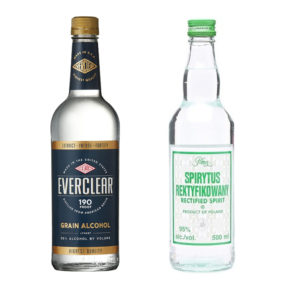
For producers looking to create large scale commercial product, it is not recommended to buy neutral spirits directly off the shop shelf market because there will be issues with the quantity needed versus what is available, and the associated higher costs.
For distillers producing their own spirit such as gin, buying bulk supplies of neutral spirits from neutral spirits suppliers is more cost-effective than buying the commercially-available products or making their own, as this requires large industrial size still which are very expensive and require additional licenses. Furthermore, buying neutral spirits in bulk offer spirit producers more flexibility for scalability for when the business grows.
However, not all suppliers are equal. An experienced bulk neutral spirit supplier will be able to give you the best price of the product, guarantee the quality, product transparency, efficient delivery, as well as provide any advice and insight should the client require any additional information on deciding the best neutral spirit for your needs. If you are looking for neutral spirits with special certifications, such as an organic ethanol, fair trade, and kosher certification, knowledgeable suppliers will be able to provide you with those products.
While buying bulk supplies of neutral spirits is more efficient and cost-effective for commercial manufacture, before committing to any purchase it is important to ask for a sample of the product to ensure the quality of the purchase. Samples are also extremely useful for producers and distillers who are not certain of which type of neutral alcohol are most appropriate to them. By requesting different samples they can determine the exact product they need before committing to purchasing.

Transporting bulk quantities of neutral spirits requires specialist skills and knowledge. It is not a task that can be easily done by your average courier service as there are several legal and health & safety checks that the shipment needs to undergo. Fortunately, by working and buying from a specialist supplier this process becomes much easier. Below is the key information you need to know about the delivery process.
Neutral spirits are ethanol and ethanol is highly flammable and can be dangerous to health and safety if not handled properly will require medical attention. Some of the safety concerns include burns, redness, and rashes if it comes in contact with an open wound on the skin or eyes (in extreme cases it can cause temporary blindness). The inhalation of the liquid or its fumes can cause similar burns to the nose, throat, and lungs. Finally, the ingesting large quantities of the high strength alcohol will impair your motor skills, make you nauseous and can give you alcohol poisoning.
There are different packaging and transportation options when it comes to ordering bulk neutral spirits and it all depends on the order quantity and the end destination. For distilleries looking to order on the smaller end of the scale, HDPE or Metal Drums with capacities of 25/200Litres might be the way to go. For those looking for a bigger supply of the product, then an ISO container or a flexitank with a capacity between 16,000 and 26,000 litres are the available options. All the packing materials must be food grade certified.
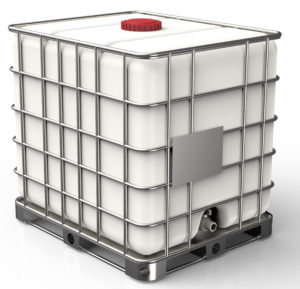
Neutral spirits can be transported by land or sea with various packaging options available for each (see our Logistics page to see all the options) and no matter the order quantity and end destination, the transporting of neutral spirits requires special handling and expertise. Under the ruling and regulations of the United Nations Economic Commission for Europe (UNECE), ethanol falls under Class 3 in the Hazard Warning Classification which means that in any shipping and road transportation of the product will require extra specialist care and precaution, safety certificates such as an MSDS (material safety data sheet), and specific labelling. For example, it’s compulsory for all vehicles carrying dangerous goods to have an orange plate with the hazards identification number and the UN Recommendations on the Transport of Dangerous Goods number. In the case of alcohol, the UN number is 1170. In addition to this, all road transport goods within Europe must be compliant with the ADR treaty (Accord Dangereux Routier, The European Agreement concerning the International Carriage of Dangerous Goods by Road).
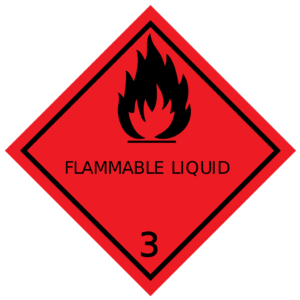
These rules and regulations vary across the globe. Some countries are more relaxed and others are stricter. It can be difficult to navigate the various safety and legal requirements. Fortunately, Ethimex has experience in the worldwide transportation of ethanol and will organise all transport and logistics regarding your product.


There is no “one rule fits all” when it comes to the various taxes and licenses required to buy ethanol. That being said, in almost all cases a company is required to have an alcohol importing license in order the buy bulk neutral alcohol. The taxes involved in purchasing bulk alcohol can be determined on the state, federal, or country-level or by trade or trade and political organisations such as the EU.
Generally, alcohol and all matter of spirits are subject to heavy tax. In the EU this is referred to as “excise duty.” Excise duty is an ‘indirect tax’ placed on good such as alcohol. The reason why it’s referred to as an ‘indirect tax’ is because the producer is expected to recover the cost of this duty by adjusting the final price of the good. The cost of the excise duty is calculated based on the quantity of the good, not its value. In the case of ethanol, tax authorities will determine the cost based on each hectolitre (a metric unit of capacity equal to one hundred litres) sold. Excise duty rates vary between countries, including those who are part of large economic unions such as the EU. If you are looking to find out the exact rates for each member state of the EU, this excise duty table document from the European Commission has the latest information. Extra customs duties are also collected on imported alcohol, the costs of which vary depending on the country. Denatured alcohol can be exempted from excise duty.
To buy alcohol without excise duty it has to be bought “in bond”, transported “under bond” to a bonded warehouse. A bonded warehouse is a “duty-free zone”, whereby no sales/VAT and duty have been paid on the products stored here. In the warehouse, the product is allowed to be sorted, cleaned, and repacked but nothing akin to manufacturing is allowed. A bonded warehouse is useful if the product is not required immediately. As soon as the product is moved for export or consumption, duty has to be paid.
Buying your supply of neutral spirits from a specialised and reputable company will make it easier to navigate the legal work, which can be overwhelming!
The latest stats have shown that the beverage spirits market is going up, which means there will be a continual need of neutral spirits as well. There are different types of neutral spirits on the market, most of which have a specific or preferred use, such as the use of potato-based spirits for higher-end vodka.
However, regardless of its end use, distillers and drinks producers are better off to get their supply of the spirit from bulk suppliers who have the logistics capability to not only handle large orders of this dangerous material, but also have the expertise to navigate the often complex and various tax and customs matters, and also obtain special certificates such as organic, kosher, fair trade and more, should the distiller/producer require such things for their product.
If after reading this guide you still have questions about neutral spirits or are looking to buy some, you can find all the premium neutral spirits available on our Premium Neutral Alcohol page or send us an email at info@ethimex.com or gives us a call at +44 (0)20 8968 2104. We are here to help!

Fill out the form below to subscribe to our mailing list and download our fact sheet